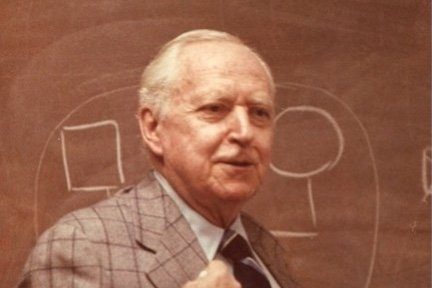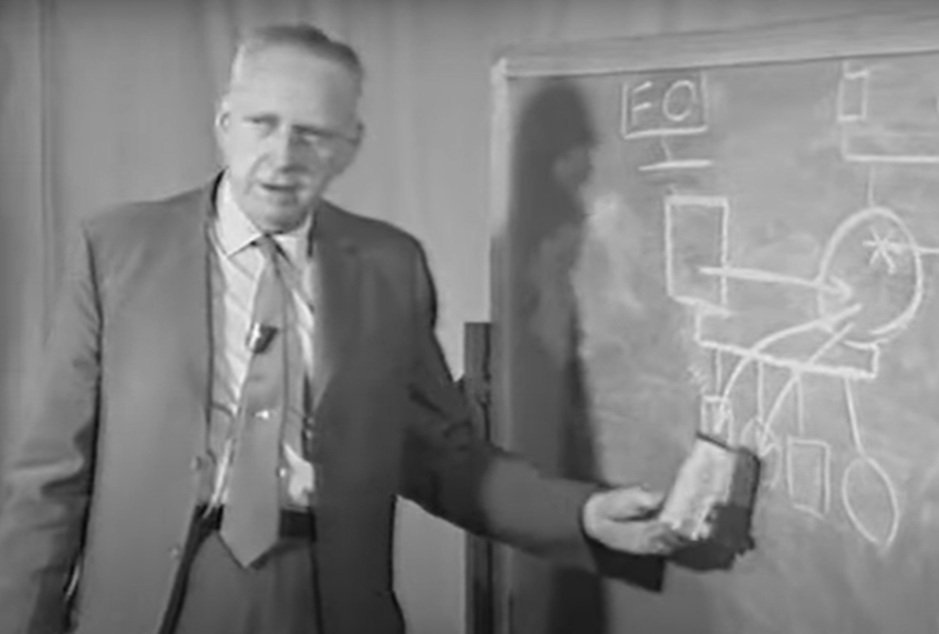
INTRODUCING BOWEN SYSTEMS 1/3
This blog is the first in a three-part series unpacking the Team Brain®approach as developed by Dr Kathryn Kissell.
In this first blog in a three-part series, discover the evolution of Murray Bowen's Systems Theory, from its empirical roots to its current practical applications and its inspiring impact on the Team Brain programme.
Murray Bowen was born in 1913 in Waverley Tennessee, America, the eldest of five siblings raised on the family farm. His experience as a surgeon in World War II, where he encountered as many psychiatric casualties as surgical ones, influenced his decision to train as a psychiatrist and psychoanalyst at the Menninger Foundation in Kansas in 1946.
In the 1950s Bowen joined the National Institute of Mental Health, Bethesda to research the expression of schizophrenia in adult children and the impact of family relationships. In a unique study, entire families moved into the hospital for several months allowing the project to observe and analyse their ongoing interactions. The study’s initial hypothesis was based on Freudian psychoanalytic theory, the dominant framework of the time, and anticipated that the mother-child relationship would be a key factor in the child’s symptom expression.
Bowen soon realised that the entire family, not just the child and mother, engaged in patterned interactions that predictably repeated under similar conditions. He observed that adjusting these behavioural patterns positively impacted the child's symptoms and that when one family member left the hospital for a period, a member of the nursing staff would automatically and without awareness fill the vacant role to maintain these default exchanges.
These observations led Bowen to shift his focus from the mother-child relationship to direct his attention to the influence of the family unit as a whole. In the years of empirical research and observation which followed, Bowen expanded his studies to investigate the family dynamics present for children experiencing a diverse array of difficulties and noticed consistent patterns of relationship interactions and a correlation with symptom severity.

Murray Bowen teaching at the Georgetown Family Centre, now known as The Bowen Centre
This research led to the development of a set of systematic principles: eight interlocking concepts that provide a theoretical framework for understanding psychological difficulties by focusing on the impact of the individual’s relationship system. These concepts form the basis of Bowen systems theory: Triangles, Projection, Distancing and Cut-off, Nuclear Family Emotional System, Sibling Position, Multigenerational Transmission Process, Emotional Process in Society and Differentiation of Self. The first seven concepts will be unpacked in detail in the next blog with Differentiation, which Bowen highlighted as the “cornerstone of his theory” unpacked in detail in the final blog in the series.
Bowen integrated his family research with an understanding of humans as products of evolution. He viewed families as emotional units that evolved to enhance the survival and reproduction of their members. Cohesion and cooperation in groups were facilitated by patterned behavioural dynamics. However, such default interactions become problematic under heightened stress, pressure, and tension. At a critical level of intensity, previously beneficial interactions started to create relationship difficulties and resulted in individual psychological and physical symptoms.
As is often the case, other psychiatrists and psychologists were also moving from an individual perspective on well-being towards a systematic understanding during this period. The field of family systems emerged, and in 1974, to distinguish his approach from the work of other researchers, Bowen termed his theory “Bowen Family Systems theory” or for short, “Bowen Systems theory”. Offering one of the first comprehensive theories of family systems functioning, it continues to be a central influence in the practice of family therapy in North America.
Bowen published Family Therapy in Clinical Practice as a compendium of papers which presents the evolution of Bowen System theory from his earliest essays unpacking his 1950s research, through to his experiment in differentiating himself from his own family of origin and his articulation of the core theoretical concepts.
Over the years, numerous clinicians, researchers, and authors have articulated Bowen Systems Theory for various audiences. Notably, Michael Kerr, who worked with Bowen for 20 years and succeeded him as director of the Georgetown Family Center after his death, has made significant contributions. Kerr co-authored Family Evaluation with Bowen, systematically detailing the application of Bowen Theory in clinical family work. More recently, Kerr published Bowen Theory’s Secrets (2019, New York: Norton & Company), offering an updated articulation of the theory.
Bowen died in 1990 and as his first students are now reaching retirement age, there is a fresh generation emerging who are breaking new ground with Bowen systems thinking.
Dr Kathleen Smith is a therapist and writer who particularly explores Bowen systems’ distinct and revolutionary way of understanding anxiety as rooted in relationship dynamics. Her books are highly practical and easily accessible, and her first book, "Everything isn't Terrible" is generally the first Bowen systems book I recommend to clients.
Jeffrey Miller a family therapist, management consultant and executive coach specialises in helping anxious organisations function more effectively. His book, "The Anxious Organisation" makes Bowen thinking accessible and practical for those working in the corporate world.
Dr Jenny Brown has been developing Bowen systems thinking in Australia since the 1990s. Her book “Growing yourself Up: how to bring the best out of all life’s relationships” offers valuable examples and practical insights into how to enhance the quality of your relationships across the life cycle through building Bowen’s concept of differentiation. We have brought Dr Jenny’s parenting course, the Parent Hope Project to the UK as a transformative resource to support parents to become the best resource possible for their children.
In 2011, amidst intense stress and upheaval in both my personal and professional life, I stumbled upon Bowen Systems Theory. It proved to be a transformative discovery, offering profound insights into my circumstances and serving as a pillar of support during a turbulent period of transition for my family.
However, for several years, I found myself isolated in my exploration of Bowen Systems, encountering few others familiar with it. Teaching myself the theory proved challenging; although I uncovered invaluable insights, I struggled to comprehend the whole theoretical picture. Despite my desire to apply the theory, practical guidance was scarce, particularly as much emphasis was placed on cultivating relationships within extended family networks—an option not available to me.
The Team Brain programme is an attempt to reduce these hurdles and make Bowen systems thinking more accessible to those seeking deeper understanding. My goal is to facilitate the development of your differentiation and enhance your comprehension of emotional systems, empowering you to thrive personally and professionally. In addition, given my background in Counselling Psychology, I've chosen to integrate insights from other psychological theories and therapeutic approaches where they contribute to the overarching objective of fostering differentiation.
To find out more about the dynamics of relationships which Bowen articulated in his eight interlocking concepts subscribe below and get updated when the next blog is published.
References
Bowen, M. (1978). Family therapy in clinical practice. Northvale, NJ: Jason Aronson.
Brown, J (2012). Growing yourself up: How to bring your best to all of life’s relationships. New Zealand: Exisle.
Kerr, M., and Bowen, M. (1988). Family Evaluation: An Approach Based on Bowen Theory. New York: W. W. Norton & Company.
Kerr, M. (2019). Bowen theory’s secrets: Revealing the hidden lives of families. New York: Norton
Miller, J (2019). The Anxious Organisation: Why smart companies do dumb things. Florida: Vinculum Press.
Smith, K. (2020) Everything isn’t terrible: Conquer your insecurities, interrupt your anxiety and finally calm down. London: Souvenir Press.